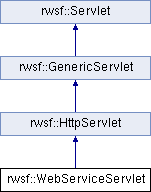 HydraExpress™ C++ 2019 |
HydraExpress™ C++ API Reference Guide |
Product Documentation: HydraExpress C++ Documentation Home |
 HydraExpress™ C++ 2019 |
HydraExpress™ C++ API Reference Guide |
Product Documentation: HydraExpress C++ Documentation Home |
Servlet implementation for hosting web services. More...
#include <rwsf/webservice/servlet/WebServiceServlet.h>

Public Member Functions | |
| void | doGet (rwsf::HttpServletRequest &request, rwsf::HttpServletResponse &response) |
| void | doPost (rwsf::HttpServletRequest &request, rwsf::HttpServletResponse &response) |
 Public Member Functions inherited from rwsf::HttpServlet Public Member Functions inherited from rwsf::HttpServlet | |
| virtual | ~HttpServlet () |
| virtual void | service (rwsf::ServletRequest &req, rwsf::ServletResponse &resp) |
 Public Member Functions inherited from rwsf::GenericServlet Public Member Functions inherited from rwsf::GenericServlet | |
| GenericServlet () | |
| virtual | ~GenericServlet () |
| std::string | getInitParameter (const std::string &name) const |
| rwsf::Enumeration< std::string > | getInitParameterNames () const |
| rwsf::ServletConfig | getServletConfig () const |
| rwsf::ServletContext | getServletContext () const |
| std::string | getServletInfo () const |
| std::string | getServletName () const |
| virtual void | log (const std::string &message) const |
| virtual void | log (const std::string &message, const rwsf::Exception &e) const |
| virtual void | log (rwsf::Logger::LogLevel lvl, const std::string &message) const |
| virtual void | log (rwsf::Logger::LogLevel lvl, const std::string &message, const rwsf::Exception &t) const |
 Public Member Functions inherited from rwsf::Servlet Public Member Functions inherited from rwsf::Servlet | |
| virtual | ~Servlet () |
Protected Member Functions | |
| virtual void | destroy () |
| virtual void | init () |
| virtual void | init (const rwsf::ServletConfig &config) |
 Protected Member Functions inherited from rwsf::HttpServlet Protected Member Functions inherited from rwsf::HttpServlet | |
| virtual void | doDelete (rwsf::HttpServletRequest &req, rwsf::HttpServletResponse &resp) |
| virtual void | doHead (rwsf::HttpServletRequest &req, rwsf::HttpServletResponse &resp) |
| virtual void | doOptions (rwsf::HttpServletRequest &req, rwsf::HttpServletResponse &resp) |
| virtual void | doPut (rwsf::HttpServletRequest &req, rwsf::HttpServletResponse &resp) |
| virtual void | doTrace (rwsf::HttpServletRequest &req, rwsf::HttpServletResponse &resp) |
| virtual rwsf::DateTime | getLastModified (rwsf::HttpServletRequest &req) const |
| virtual void | service (rwsf::HttpServletRequest &req, rwsf::HttpServletResponse &resp) |
This class represents a servlet implementation for exposing RWSF code-generated web services. The servlet is automatically instantiated by the RWSF Agent when the Agent is started, and is based on the web.xml file generated by RWSF for your project. The servlet creates an rwsf::NamingContext context object for each service. This context contains all rwsf::NamedObject objects that are required by the service.
For more information on the use of the servlet to host web services, see the main product user guide and the Web Service Development Guide.
|
protectedvirtual |
This method is called by the Agent when this servlet is about to be taken out of service. All cleanup for a servlet should be done in this method rather than in the servlet destructor.
Reimplemented from rwsf::GenericServlet.
|
virtual |
Responds to a request that uses the GET method. Servlets that implement the GET method should override this method. The default implementation returns an rwsf::HttpServletResponse::SC_METHOD_NOT_ALLOWED status code to the client.
Reimplemented from rwsf::HttpServlet.
|
virtual |
Responds to a request that uses the POST method. The POST method is used to send large or unstructured data to the servlet and is very useful when sending XML-encoded data. Servlets that implement the POST method should override this method. The default implementation returns an rwsf::HttpServletResponse::SC_METHOD_NOT_ALLOWED status code to the client.
Reimplemented from rwsf::HttpServlet.
|
protectedvirtual |
Initializes the servlet. After this function returns, the Agent is free to call the service method with requests. All resource allocation for a servlet should be done in this method rather than in the servlet constructor.
A derived class that overrides this function must call the parent init() function. Derived classes should throw rwsf::ServletUnavailableException to indicate failure. If this function throws an exception, the Agent does not place the servlet into service and the servlet cannot receive requests. Due to C++ scoping rules, a derived servlet that overrides this method should also override the signature that takes an rwsf::ServletConfig. Only one of the signatures should contain initialization code; the other signature simply forwards to the parent init() method.
Reimplemented from rwsf::GenericServlet.
|
protectedvirtual |
Initializes the servlet. After this function returns, the Agent is free to call the service method with requests. The config object contains initialization and startup parameters. All resource allocation for a servlet should be done in this method rather than in the servlet constructor.
A derived class that overrides this function must call the parent init() function. Derived classes should throw rwsf::ServletUnavailableException to indicate failure. If this function throws an exception, the Agent does not place the servlet into service and the servlet cannot receive requests. Due to C++ scoping rules, the derived servlet should also override the signature that takes no arguments. Only one of the signatures should contain initialization code; the other signature simply forwards to the parent init() method.
Reimplemented from rwsf::GenericServlet.
|
Copyright © 2019 Rogue Wave Software, Inc. All Rights Reserved. |